On September 4, 1971, members of the Instituto Geográfico Nacional (National Geographic Institute) took photographs above Lake Cote for the Costa Rican governmental company that provides electricity and telecommunication services. The photographs were taken for the construction of a hydroelectric dam near lake Arenal, when the mapping agency members accidentally captured a UFO in their high-resolution camera that was mounted on the plane, pointing downwards. The photograph is considered to be the clearest and best UFO photograph ever taken.
Sergio Loaiza, Juan Bravo and Francisco Reyes were flying in a Canadian-made Areo-Commander model F680 piloted by Omar Arias, and Loaiza was in charge of aerial photography that day. They were flying above Costa Rica with a 100-pound map-making camera when Loaiza captured a photograph of a metallic disc like a typical alien “flying saucer” that can be seen flying between the F680 aircraft and the ground.
They were flying at 10,000 feet, mapping the landscape beneath with the high-resolution camera that was programmed to take photos every 20 seconds. While reviewing the negatives, Loaiza could not believe his eyes. He even said that they were completely banned from talking about it. According to UFO researcher Oscar Sierra, the photographs were analyzed in the USA and France and found to be 100% real. (Source)
The object can only be seen in the photograph in frame number #300 in the sequence, and there is no indication of it in either the frame of film that came before it or the one that was taken immediately after it. Due to the film stock and the quality of the camera, the image was incredibly clear. This object was not in either the frame before it (#299) or the frame after it (#301).
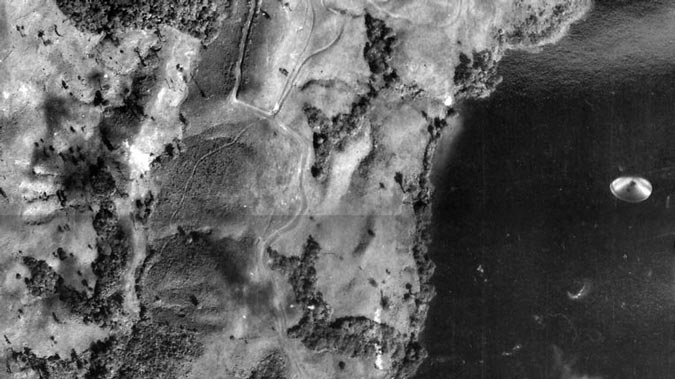
During the actual flight, the captain and his three crew members did not witness anything, and neither did the other passengers. It is estimated that the UFO was anywhere between 120 and 220 feet across, but the actual width would have depended on the object’s exact altitude.
New York Times writer and author Leslie Kean revealed that she has a framed copy of the photo taken at Lake Cote in the May 10, 2021 issue of The New Yorker by Gideon Lewis-Kraus. The article states, “…On the wall behind her desk, there is a framed black-and-white image that looks like a sonogram of a Frisbee. The photograph was given to her, along with chain-of-custody documentation, by contacts in the Costa Rican government; in her estimation, it is the finest image of a U.F.O. ever made public.”
On the New Yorker Radio Hour, she said: “I love this photo. It’s probably the best photograph of a UFO ever taken. It was taken in the 70s from a government mapping plane in Costa Rica which had a camera strapped on the bottom of the plane and it was like going over the terrain. There was this disc object and you clearly see the sun reflecting off this round object that’s got a little dot on the top and what’s important about it is that it was a government photo. There’s a clear chain of custody. It’s always been in possession of the Costa Rican government so you know it’s authentic and it’s completely unexplained.” (Source)
Read also:
- Ex-NASA Astronaut: ‘We have Contact With Alien Cultures & Their Appearance Is Bizarre’
- Famous 19-Sec UFO Footage Could Be Greatest Leak: CGI Experts Say It Is Real Deal
- Einstein’s Student Claimed US Govt. Re-Engineered UFO & Studied Alien Bodies
- Ex-Apollo Astronaut Claimed Humans Are Ancient Aliens, Visited Earth From Space
In 1985, computer scientist and astronomer Dr. Jacques Vallee obtained a copy of the negative and circulated it to his contacts in the United States government and at a California tech company. However, none of them helped Dr. Vallee in analyzing the negative.
Eventually, in December 1987, Vallee took it to Dr. Richard Haines in San Francisco. Haines was a retired aerospace engineer who had worked for NASA, and Vallee knew him. The photo was scanned, blown up, and looked at. Haines’ first focus was on the lighting. In 1989, Vallee and Haines wrote a “Photo Analysis of an Aerial Disc Over Costa Rica” for the Journal of Scientific Exploration. The 19-page report concluded: (Source)
“In summary, our analyses have suggested that an unidentified, opaque, aerial object was captured on film at a maximum distance of 10,000 feet. There are no visible means of lift or propulsion and no surface markings other than dark regions that appear to be nonrandom… There is no indication that the image is the product of a double exposure or a deliberate fabrication.”
There has always been speculation as to whether the craft had just emerged from or was about to enter Lake Cote. There are numerous local stories concerning UFOs emerging from the water. But it is impossible to understand the path of the craft because it only appeared in one frame #300. The original negative has been kept by the Costa Rican government, and it may be found in the country’s National Archive. There are copies available, such as the one that Vallee and Haines analyzed.
Loaiza’s UFO photograph has never been explained, despite the fact that UFO skeptics have thoroughly examined it. UAP Media, a UK-based UFO research company has got a brand fresh ultra-high resolution drum scan of the original photograph.
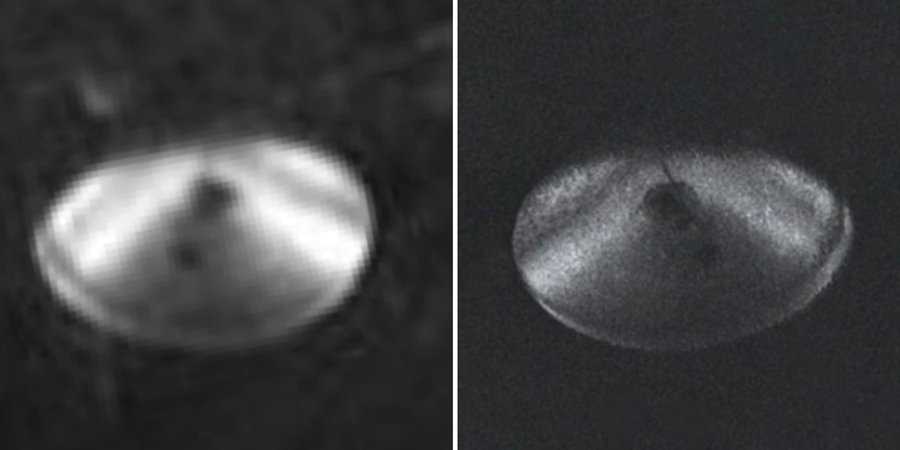
—Graeme Rendall – Author of UFOs Before Roswell and Flying Saucer Fever: “It’s a really intriguing photograph, and one which totally captures the imagination. I’m always impressed as to how “right” it looks. As to its veracity, though, I can’t say, but I’d love it to be true. It definitely looks a lot more convincing than a lot of other images I’ve seen over the years. I’d have to leave it to the photo analysis experts to pronounce sentence on it though.”
—Vinnie Adams – member of UAP Media: “After looking into the case, reading about the circumstances surrounding what was seen from that aeroplane that day, and reading the analysis done previously by Dr. Jacques Vallée, it does come across as a very compelling case. The fact that after 50 years it still hasn’t been conclusively proven or debunked is very interesting. Now that we have this high-resolution drum scanned version of the image, hopefully it might reignite interest in the case and lead to further analysis and some sort of conclusion.”
—Luis Elizondo – Former director of AATIP: “Although I was not around during this incident, pilot reports of smooth, shiny, lenticular craft are not new. In fact, even to this day, pilots, both civilian and military, along with their aircrew, continue to witness these types of craft and oftentimes displaying performance capabilities well beyond state of the art. Thankfully, some of these newer incidents are finding their way to Congress due to the courage of our fine men and women in uniform. During my time in AATIP, these incidents were surprisingly common.”
— Jeremy Corbell – Filmmaker: “As we search for meaning behind the UFO presence, it’s important that we remember we are more effective collectively when perusing analysis. Historic images like this one from Costa Rica still have stories to tell, and new insights are sometimes just around the corner. If we can socially democratize and crowdsource our search for answers – we will arrive closer to the truth than if we simply wait for further confirmation from our governments. I’m elated higher fidelity imagery continues to emerge, especially when it allows us to get a glimpse into our UFO past. Makes one wonder what other UFO evidence is lurking in boxes or files that have remained elusive until now. I’m confident that more and more people will be coming forward with valuable insight and evidence in the near future.”




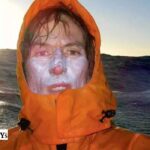
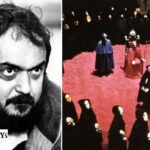
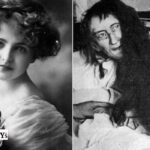
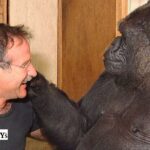
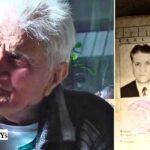
Wow!
ufo … or maybe just an unscrewed metal foot saucer form falling off the plane ?
This craft has a distinct historical echo of some of the ancient Roman & Biblical sightings in the power of its simplicity. A flying shield indeed!
Many, perhaps all, UAP seem to know when a human is about to snap a photo of them since many vanish, the person inexplicably forgets to press the button, or the photo is fuzzed. We’re used to seeing poor photos and many suspect the phenomenon deliberately interferes. The lack of evident interference here may be due to the camera’s having been on auto, especially if the aircrew’s minds were elsewhere at the time.